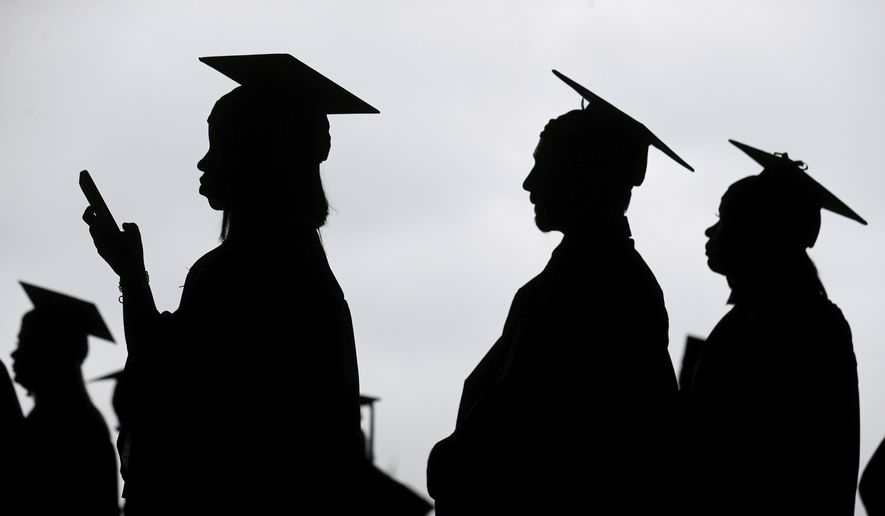President Biden on Thursday clung to his embattled plan to write off billions in student loan debt as he kicked off his final swing through deep-blue states to make the case for Democrats ahead of next week’s critical midterm elections.
Speaking at a community college in Albuquerque, New Mexico, Mr. Biden promised to fend off legal challenges that have put his plan on hold, saying he would not let Republicans get away with blocking the $420 billion in relief.
“Republican members of the Congress and Republican governors are doing everything they can, including taking us to court to deny relief,” the president said. “As soon as I announced my administration’s plan for student debt, they started attacking even though I ran out and everybody knew what I was going to do.”
“Their outrage is just simply wrong,” he said. “We’re fighting them in court. They’re not going to get away with it.”
Mr. Biden in August announced his long-awaited student debt forgiveness plan, which includes canceling $10,000 in student debt for borrowers who earn less than $125,000 per year and an additional $10,000 in debt for those who received Pell Grants.
Mr. Biden’s plan calls for lowering monthly payments on outstanding undergraduate loans from 10% to 5% of discretionary income and forgives loan balances after 10 years of payments, instead of 20 years for original loan balances of $12,000 or less.
SEE ALSO: Midterm election finale shifts focus to Trump’s 2024 announcement
He also announced one “final” pause on federal student loan repayments brought on by the COVID-19 pandemic, through December.
The plan is getting criticism from the left and the right and is likely to face significant legal scrutiny. Some liberals said Mr. Biden didn’t do enough. They wanted him to cancel $50,000 or more per borrower.
Republicans said the bailout, which is estimated to cost taxpayers as much as $600 billion, would primarily benefit wealthy people who are on a high-earning career path.
They also faulted it for being more out-of-control spending from Democrats. Republicans insist that increased government spending is a key driver of inflation.
Maya MacGuineas, president of the nonpartisan Committee for a Responsible Federal Budget, said the plan “might be the most costly executive action in history.”
“It’s unacceptable that the president would implement it without offsets and without congressional approval,” she said. “With inflation at a 40-year high and the national debt approaching record levels, we shouldn’t be adding to deficits — certainly not by executive fiat.”
SEE ALSO: Mehmet Oz holds 2-point edge over John Fetterman in Pa. Senate race, poll shows
The plan has been met with legal challenges on multiple fronts.
A federal appeals court temporarily blocked the plan from moving forward last month after six Republican-led states sued, arguing that it would further damage the economy.
The ruling, which paused the rollout until the court hears further briefings on the matter, came less than a week after the Department of Education launched its online portal for borrowers to apply for forgiveness.
The White House said as of Thursday, the Department of Education has received nearly 26 million applications for forgiveness, 16 million of which have been approved and remain on hold.
Mr. Biden’s remarks on Thursday kicked off his final trip to make the case for Democrats ahead of next week’s election to decide which party controls Congress.
Following his stop in New Mexico, Mr. Biden will travel to deep-blue California before heading to Democrat-heavy Chicago on Friday and Philadelphia on Saturday.
Despite swinging out west, the unpopular president is noticeably steering clear of battlegrounds Arizona and Nevada, where Democrats face tight Senate races that could decide which party has the majority in the next Congress.
Democrats face particularly stiff headwinds in the midterms from persistently high inflation and an economic outlook that grows more gloomy by the day.
The Consumer Price Index increased 0.4% in September after rising by 0.1% in August, exceeding expectations and showing that inflation remains a stubborn problem in the final monthly report before the midterm elections.
The annual inflation rate of 8.2% was down slightly from 8.3% in the previous month, though it remains a historically high burden on consumers. Inflation reached a 41-year high of 9.1% in June.
Mr. Biden has pointed to the $740 billion tax-and-spending bill he signed over the summer as the way out of choppy economic waters. Democrats say the law will eventually restrain inflationary pressures.
Critics pan the measure as more government spending that will add to inflation. They also point to other forms of spending under the administration, such as Mr. Biden’s plan to write off billions of dollars in student loan debt, as compounding the problem.
• Joseph Clark can be reached at jclark@washingtontimes.com.




Please read our comment policy before commenting.